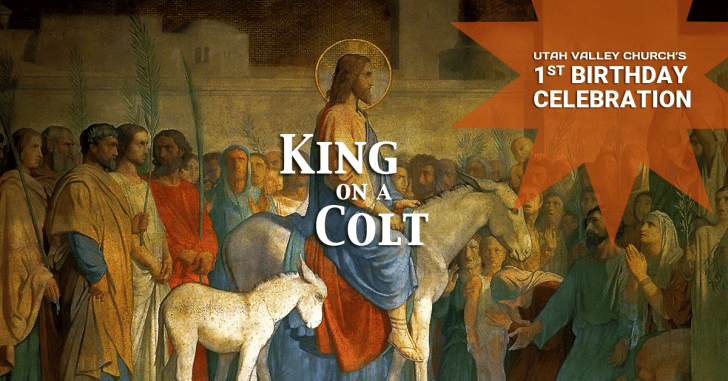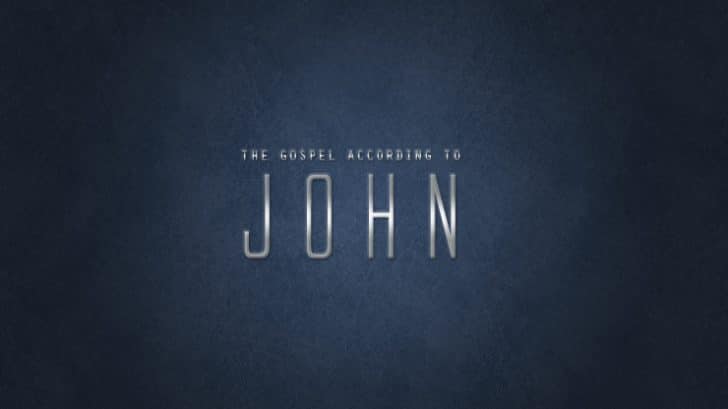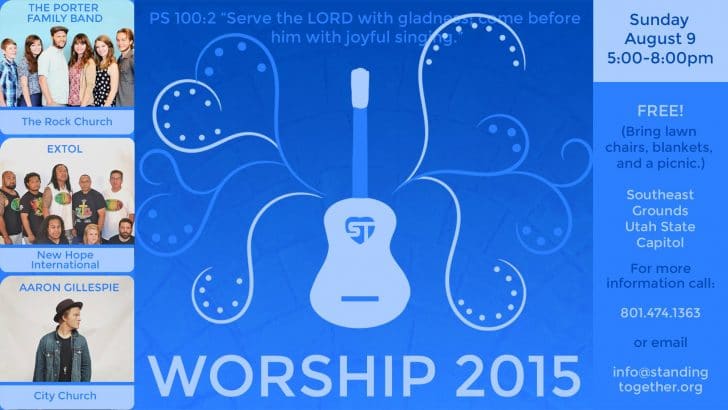John 12:9-19 | King on a Colt
[efstoggles class=”yourcustomclass”]
[efstoggle active=”” title=”Click here for today’s text”]
9 When the large crowd of the Jews learned that Jesus was there, they came, not only on account of him but also to see Lazarus, whom he had raised from the dead. 10 So the chief priests made plans to put Lazarus to death as well, 11 because on account of him many of the Jews were going away and believing in Jesus.
12 The next day the large crowd that had come to the feast heard that Jesus was coming to Jerusalem. 13 So they took branches of palm trees and went out to meet him, crying out, “Hosanna! Blessed is he who comes in the name of the Lord, even the King of Israel!” 14 And Jesus found a young donkey and sat on it, just as it is written,
15 “Fear not, daughter of Zion;
behold, your king is coming,
sitting on a donkey’s colt!”
16 His disciples did not understand these things at first, but when Jesus was glorified, then they remembered that these things had been written about him and had been done to him. 17 The crowd that had been with him when he called Lazarus out of the tomb and raised him from the dead continued to bear witness. 18 The reason why the crowd went to meet him was that they heard he had done this sign. 19 So the Pharisees said to one another, “You see that you are gaining nothing. Look, the world has gone after him.” (John 12:9-19)
[/efstoggle]
[/efstoggles]
Centrality of Christ
As we consider the entirety of scripture, Genesis to Revelation, we discover an undeniable common thread. This common thread is not just a side theme or featured portion of scripture, it is the central focus. The common thread or central focus is Christ. In the Old Testament Christ is predicted. In the Gospels Christ is revealed. In the Acts of the Apostles Christ is preached. In the epistles Christ is explained. In Revelation Christ is expected. Christ is the center of all things, he is before all things, and in him all things hold together. So, today we will focus on the centrality of Christ as it pertains to his kingship.
The event within an event within an event
Now, today’s text is really an event within an event within an event. Let me start with the outer event and work our way through. The first event surrounding today’s text was the resurrection of Lazarus. This had taken place several days before hand. Jesus had called Lazarus out of the tomb after being dead for four days. It created a set of circumstances that shortly led to the arrest and crucifixion of Jesus. The the Sanhedrin had concluded that Jesus posed a threat to their comfortable way of life. They saw the crowds turning to him because he resurrected a man from the dead. They feared a zionist revolt and that Jesus would be named king by the people. This would compromise their standing with the Rome and the Romans would likely dispose of them if this happened.
The second event was the Passover. Let’s look back at John 11: 55-56. Now the Passover of the Jews was at hand, and many went up from the country to Jerusalem before the Passover to purify themselves. They were looking for Jesus and saying to one another as they stood in the temple, “What do you think? That he will not come to the feast at all?”
The Passover was an annual Jewish event. Many of the Jewish people would make their pilgrimage to Jerusalem each year to celebrate the central holiday of the Hebrew people. For centuries they made this journey up to Jerusalem for the Passover. Infact, you’ll notice that Psalm 120 through Psalm 134 are labeled as psalms of ascent. These are songs that would have been sung by the people as they made their way up to Jerusalem which is situated on a hill above the surrounding countryside. You can visualize their anticipation as they looked up to Jerusalem, the city which represented the dwelling place of the Lord, and sang these words: “I lift up my eyes to the hills. From where does my help come? My help comes from the Lord, who made heaven and earth.” (Psalm 121:1)
Thirdly, you may be thinking, is this Palm Sunday and I somehow missed it? Did they change the date? No, it’s September 13, 2015 and not Palm Sunday. However this is where we have arrived after one year studying of the Gospel According to John. This is a well know story, yet seldom preached outside of Palm Sunday. We know this event well. Jesus made his way into Jerusalem riding a donkey. The crowds placed their outer garments on the path before him as though to pave a pathway for the King. They took palm branches and shouted, “Hosanna! Blessed is he who comes in the name of the Lord, even the King of Israel!”
Looking for a king
The people were looking for a king. This wasn’t a new or strange concept. It was a scriptural concept. If we look at Luke 1.32-33 we read: And behold, you will conceive in your womb and bear a son, and you shall call his name Jesus. 32 He will be great and will be called the Son of the Most High. And the Lord God will give to him the throne of his father David, 33 and he will reign over the house of Jacob forever, and of his kingdom there will be no end.”
Look at in Zechariah 9:9. Rejoice greatly, O daughter of Zion shout aloud, O daughter of Jerusalem! Behold, your king is coming to you; righteous and having salvation is he, humble and mounted on a donkey, on a colt, the foal of a donkey.
If we go back to Isaiah 32 we read about a king who will reign in righteousness. In 2 Samuel we read about God’s promise to David to place one of his descendants on his throne to reign as king forever. And in Genesis 49:10 we read about Jacob’s blessing over his son Judah. The scepter shall not depart from Judah, nor the ruler’s staff from between his feet, until he comes to whom it belongs; and to him shall be the obedience of the peoples.
King on a colt
Despite the mixed motives the people were looking for a king. Some were looking for someone to lead them to freedom from the Romans. Some were looking for a fulfilment of scripture. Some were just looking for the next big thing; something to be excited about.
So, here’s this crowd that just heard eye witness testimony that Jesus had raised Lazarus from the dead. There was already a lot of excitement in the air because of the holiday and this news amplified the intensity of the moment as Jesus came riding into town on a donkey. Verse 14 says, “And Jesus found a young donkey and sat on it, just as it is written…(John 12:14)”
We like to picture Jesus in a way we can relate to. I picture Jesus as a cowboy type figure. Sadly, this is the only time Jesus is recorded riding anything. But it is clearly to fulfil scripture. The disciples didn’t even catch what was going on. Verse 16: His disciples did not understand these things at first, but when Jesus was glorified, then they remembered that these things had been written about him and had been done to him. (John 12:16)
The implications of Jesus as king
May we not miss the implication of Jesus’ kingship. But what does it mean that Jesus is king? What kind of king is he? What are the boundaries of his kingdom? What are the implication of kingship of Jesus?
King of our salvation
First, Jesus is king over salvation. He’s the is king over life and death.
Jesus came to us in a tri fold manner. I like how Alistair Begg states this, “Christ came as a prophet to oust our ignorance and as a priest to deal with our alienation and to lead us into God’s presence. Now we see him as a king who subdues all the tyrannical forces that are arraigned against us, and, yes, those that fight within us too.”
We desperately need a king who can conquer all of the tyrannical forces that are arraigned against us. Remember story of David and Goliath? The Israelites were facing a they tyranny of the Philistines. Their great war icon Goliath taunted the army of the Israelites when an unlikely hero stepped forward. David, a young boy, with the heart of a warrior took five stones and a sling faced the enemy and defeated the undefeatable. He conquered this enemy single handed, but on behalf of the nation.
In the same way as his father David, Jesus came riding in as a warrior. A warrior that came to battle the tyrannical forces that we cannot defeat. He fent face to face with sin, Satan and death and came out the victor on our behalf.
And you, who were dead in your trespasses and the uncircumcision of your flesh, God made alive together with him, having forgiven us all our trespasses, by canceling the record of debt that stood against us with its legal demands. This he set aside, nailing it to the cross. He disarmed the rulers and authorities and put them to open shame, by triumphing over them in him. (Colossians 2:13-15)
The cross must be central to our theology, it must be central to our teaching. We may only preach the text we’re considering today only once a year, but we must be faithful in preaching Christ and the power of his cross always. The cross is central to our salvation and without it we have no victory over the rulers, authorities, and record of debt that stood as a tyrannical forces against us. The entire victory came through Christ alone by way of his cross. Through his death on the cross, his burial, and his resurrection he has become the king over our salvation. He is king over life and death and there is no other way.
King of the cosmos
Second, Christ Jesus is king of the cosmos. You may be thinking that that’s a pretty big stretch. We don’t even know the boundaries of the cosmos.
Our earth is so magnificent and complex that we haven’t even begun to scratch the surface in terms of understanding it. Every time we think we’ve made a great discovery, we realize that we are wrong and have to admit our ignorance. Headlines in scientific journals are often phrased like this, “Recent discovery of… causes us to rethink everything we thought to be true about…” We know that earth is part of a greater solar system. Our solar system is part of the milky way galaxy. Than galaxy is comprised of more than 200 billion stars. Astronomers estimate that our galaxy is only one of 100 billion plus galaxies.
Lift up your eyes on high and see: who created these? He who brings out their host by number, calling them all by name, by the greatness of his might, and because he is strong in power not one is missing. (Isaiah 40:26)
Scientists look at the universe and wonder how it’s all held together. They can’t explain the cosmic glue that holds the cosmos and everything in it in it’s place. Speaking of Jesus, Colossians says, “He is the image of the invisible God, the firstborn of all creation. For by him all things were created, in heaven and on earth, visible and invisible, whether thrones or dominions or rulers or authorities—all things were created through him and for him. And he is before all things, and in him all things hold together.” (Colossians 1:15-17)
Christ is the cosmic glue, the uncaused cause. He is king over the cosmos. That’s why John starts his gospel with these words, “In the beginning was the Word, and the Word was with God, and the Word was God. He was in the beginning with God. All things were made through him, and without him was not any thing made that was made.” (John 1:1-3)
King of time and eternity
Thirdly, Christ is king of the future; he’s king over time and eternity. A Christian’s view of time is that God is the creator and controller of time. The Christian timeline goes like this: The good; the bad; the new; the perfect. God made everything good. Sin entered and things became bad. Christ came and made things new. Christ is coming again to make things perfect.
Christ is king over the past. That’s why Paul speaks to the Areopagus he starts with these words, “The God who made the world and everything in it, being Lord of heaven and earth, does not live in temples made by man, nor is he served by human hands, as though he needed anything, since he himself gives to all mankind life and breath and everything.” He say’s that is all begins with God. The Christian view of time says, “In the beginning God.” Those who counter Christianity say, “In the beginning…”
Christ sovereign over all circumstances. He is king over the past and he’s also king over the future. Philippians 2:10-11 says, “so that at the name of Jesus every knee should bow, in heaven and on earth and under the earth, and every tongue confess that Jesus Christ is Lord (YHWH), to the glory of God the Father.” This is not an expression of devotion, but a statement of fact.
Is Christ king over your salvation? Is he king over your cosmos? Is he king over your future?
We have an approachable king…
We have a king who stoops to become human…
We have a king who serves…
We have a king who dies for us…
I he just a king on a colt, or is he king of your heart?
Notes still in progress…





